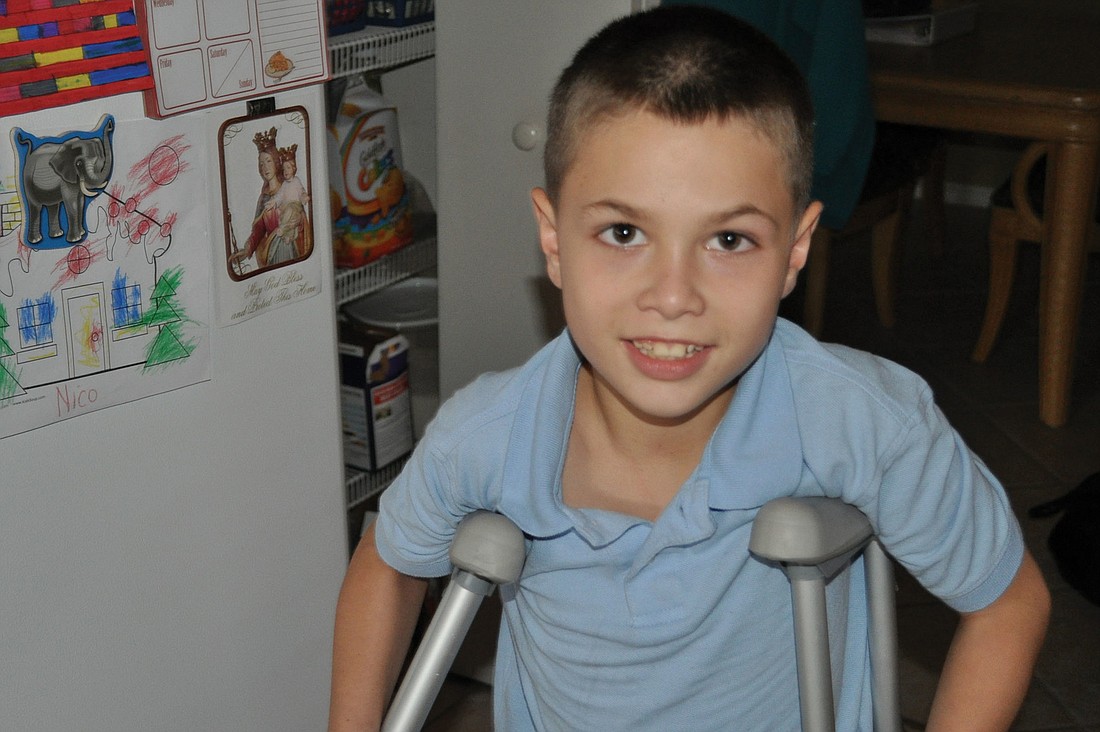- November 28, 2024
-
-
Loading

Loading

LAKEWOOD RANCH — Max Collado stood on a broken foot while he did his homework.
Then, he abruptly hopped to the couch where the History Channel awaited.
Max stared hard at the screen and ignored pleas from his mother to return to his homework.
That’s when the screech of the school bus brakes from outside told him to run to the front door, open it and welcome home his younger brother.
Max returned with crutches.
A 9-year-old at Sea of Strengths Academy in Lakewood Ranch, Max suffers from attention deficit hyperactivity disorder (ADHD), dyslexia and post-traumatic stress (PTS).
Max’s mother, Alexandra Collado, took him in as a foster baby at 3 months old and ended up adopting him. She took part in Lakewood Ranch’s first Children and Adults with Attention Deficit/Hyperactivity Disorder (CHADD) group. CHADD is a 25-year-old national support group for parents of children with ADHD. The Lakewood Ranch group held its first meeting Dec. 5.
Susan Stevens, owner Sea of Strengths Academy, a school with fewer than 20 students and four teachers designated to teach children with learning disabilities, speech language disabilities, ADHD or those who struggle in reading and math, started the local CHADD group in response to a growing need.
Open and free to the public, the group will meet once a month for an hour and feature guest speakers, such as a school psychologist or a doctor, every session.
“I’ve always wanted to do this,” Stevens says. “It (ADHD) is such a hidden problem. It provides an opportunity for parents to strategize about how to deal with it. Kids with ADHD have problems with self-regulation so it’s tough for them to realize the consequences of their actions. Parents can help with that.”
Max shows all the signs of an ADHD child — hyperactivity and focus issues that won’t go away — and more.
In occupational therapy since he was baby for sensory and fine motor-skill issues, Max, never played with anything or anyone.
He couldn’t handle sports; there were too many children and too much action.
He tried Cub Scouts, but would go from chasing friends, to sitting in a corner and not talking.
“He would just wander around,” says Collado, who has a biological son and five adopted children, including Max. She also cares for a medical foster baby. “There would be off-the-wall, out-of-control meltdown and tantrums,” says Collado.
Max interrupted: “I like anything fun. I can’t stand when I’m inside with nothing to do.”
The problems went deeper for Max.
Before he was 4, doctors diagnosed him with ADHD, PTS and dyslexia — a visual processing disorder that makes reading difficult.
Max was reunited with his biological parents before Collado officially adopted him. But the parents couldn’t prove themselves fit to care for Max, so he returned to the Collados.
“He doesn’t have concrete memories of that, but there’s always this feeling of ‘I’m going to lose somebody,’” Collado says. That’s where the PTS comes from.
At Tara Elementary School, Max would refuse to read and write, although he was advanced in math.
As the bad reports cards rolled in, Max began thinking he was dumb. That turned into behavioral issues and the ADHD symptoms seemed to get worse.
Seeking more individualized care, Collado started Max at Sea of Strengths this year. She calls it a “godsend.” Max has already brought in straight A’s.
Sea of Strength teaches phonetic sounds. Sitting on the couch, Max tapped his thumbs together. He says one thumb represented the letter ‘B’ while the other equaled ‘D.’ Put it together and you get “bed,” he says. At Sea of Strengths, teachers also bring out Max’s compassion rather than dwell on what he can’t do.
“Public school teachers would grow aggravated with him,” Collado says. “They didn’t see that, yes, Max can be pain, but he is also a wonderful little boy.”
“I love school now,” Max added. “There were too many kids before. There was all this noise at lunch, and you know me.”
As his confidence grows, Max learns to rein in his disorders. It doesn’t always work.
A few weeks ago, Max jumped off a 6-foot fence and broke his foot in two places. The other night, he picked at the wood of his bunk bed. A small piece of wood got in his eye and scratched his cornea.
Max used to be on the prescription drug Adderall but can’t take it anymore because it gave him a movement disorder that brought him to All Children’s Hospital, in St. Petersburg.
Now he takes an ADHD medicine and mood stabilizer. He usually crashes by 7 p.m.
“There are still a couple of breaks and filters missing,” says Collado.
Now, Collado turns to CHADD, as a way to help others as much as herself.
“I want other parents to know that it’s (ADHD) out there,” Collado says. “It’s not easy being the parent of a ADHD child. It’s not just a diagnosis for the child. The whole family is affected. It’s nice to sit with people going through the same thing and talk about not just the child, but how it affects the parents, the siblings, the marriage.”
Max will continue being himself, even if he doesn’t really understand what that means.
Collado asked her son is he knows what ADHD is. Max replied, “No.”
“For him, it is, ‘This is just the way I am,” Collado says.
Contact Josh Siegel at [email protected]